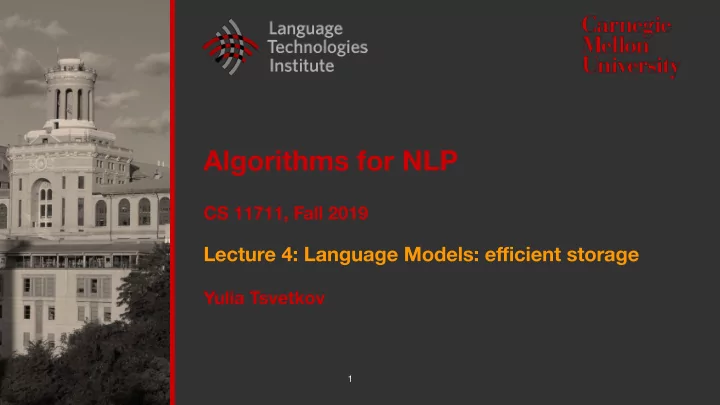

How to Build an LM
▪ Good LMs need lots of n-grams! [Brants et al, 2007]
▪ Key function: map from n-grams to counts … searching for the best 192593 searching for the right 45805 searching for the cheapest 44965 searching for the perfect 43959 searching for the truth 23165 searching for the “ 19086 searching for the most 15512 searching for the latest 12670 searching for the next 10120 searching for the lowest 10080 searching for the name 8402 searching for the finest 8171 …
https://ai.googleblog.com/2006/08/all-our-n-gram-are-belong-to-you.html
● 24GB compressed ● 6 DVDs
0 1 key value c(cat) = 12 hash(cat) = 2 the 87 2 cat 12 3 c(the) = 87 hash(the) = 2 4 5 and 76 c(and) = 76 hash(and) = 5 6 dog 11 7 c(dog) = 11 hash(dog) = 7 c(have) = ? hash(have) = 2
HashMap<String, Long> ngram_counts; String ngram1 = “I have a car”; String ngram2 = “I have a cat”; ngram_counts.put(ngram1, 123); ngram_counts.put(ngram2, 333);
HashMap<String[], Long> ngram_counts; String[] ngram1 = {“I”, “have”, “a”, “car”}; String[] ngram2 = {“I”, “have”, “a”, “cat”}; ngram_counts.put(ngram1, 123); ngram_counts.put(ngram2, 333);
Per 3-gram: 1 Pointer = 8 bytes 1 Map.Entry = 8 bytes (obj) +3x8 bytes (pointers) HashMap<String[], Long> ngram_counts; 1 Long = 8 bytes (obj) + 8 bytes (long) 1 String[] = 8 bytes (obj) + + 3x8 bytes (pointers) … at best Strings are canonicalized Total: > 88 bytes 4 billion ngrams * 88 bytes = 352 GB Obvious alternatives: - Sorted arrays - Open addressing at c
key value c(cat) = 12 hash(cat) = 2 0 1 c(the) = 87 hash(the) = 2 2 3 c(and) = 76 hash(and) = 5 4 5 c(dog) = 11 hash(dog) = 7 6 7
key value c(cat) = 12 hash(cat) = 2 0 1 c(the) = 87 hash(the) = 2 2 cat 12 3 the 87 c(and) = 76 hash(and) = 5 4 5 and 5 c(dog) = 11 hash(dog) = 7 6 7 dog 7 c(have) = ? hash(have) = 2
key value 0 c(cat) = 12 hash(cat) = 2 1 2 c(the) = 87 hash(the) = 2 3 4 c(and) = 76 hash(and) = 5 5 6 c(dog) = 11 hash(dog) = 7 7 … … … 14 15
▪ Closed address hashing ▪ Resolve collisions with chains ▪ Easier to understand but bigger ▪ Open address hashing ▪ Resolve collisions with probe sequences ▪ Smaller but more complicated implementation ▪ Direct-address hashing ▪ No collision resolution ▪ Just eject previous entries ▪ Not suitable for core LM storage
HashMap<String[], Long> ngram_counts; Per 3-gram: 1 Pointer = 8 bytes 1 Map.Entry = 8 bytes (obj) +3x8 bytes (pointers) 1 Long = 8 bytes (obj) + 8 bytes (long) 1 String[] = 8 bytes (obj) + + 3x8 bytes (pointers) … at best Strings are canonicalized Total: > 88 bytes Obvious alternatives: - Sorted arrays - Open addressing
word ids 7 1 15 the cat laughed 233 n-gram count
Got 3 numbers under 2 20 to store? 7 1 15 0 … 00111 0...00001 0...01111 20 bits 20 bits 20 bits Fits in a primitive 64-bit long
n-gram encoding 15176595 = the cat laughed 233 n-gram count 32 bytes → 8 bytes
HashMap<String[], Long> ngram_counts; Per 3-gram: 1 Pointer = 8 bytes 1 Map.Entry = 8 bytes (obj) +3x8 bytes (pointers) 1 Long = 8 bytes (obj) + 8 bytes (long) 1 String[] = 8 bytes (obj) + + 3x8 bytes (pointers) … at best Strings are canonicalized Total: > 88 bytes Obvious alternatives: - Sorted arrays - Open addressing
c(the) = 23,135,851,162 < 2 35 35 bits to represent integers between 0 and 2 35 60 bits 35 bits 15176595 233 n-gram encoding count
● 24GB compressed ● 6 DVDs
# unique counts = 770000 < 2 20 20 bits to represent ranks of all counts rank count 60 bits 20 bits 0 1 1 2 15176595 3 2 51 n-gram encoding rank 3 233
Vocabulary N-gram encoding scheme unigram: f(id) = id bigram: f(id 1 , id 2 ) = ? trigram: f(id 1 , id 2 , id 3 ) = ? Count DB unigram bigram trigram Counts lookup
▪ we’ll expand to more than 3-grams ▪ we’ll support vocabulary with 14M words
[Many details from Pauls and Klein, 2011]
Compression
Encoding “9” 000 1001 Length Number in in Unary Binary 2.9 10 [Elias, 75]
Speed-Ups
LM can be more than 10x faster w/ direct-address caching
▪ Simplest option: hash-and-hope ▪ Array of size K ~ N ▪ (optional) store hash of keys ▪ Store values in direct-address ▪ Collisions: store the max ▪ What kind of errors can there be? ▪ More complex options, like bloom filters (originally for membership, but see Talbot and Osborne 07), perfect hashing, etc
Recommend
More recommend